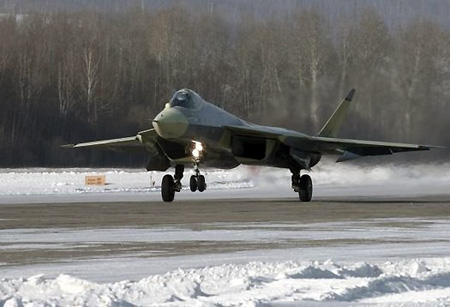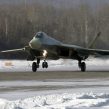
Russia Will Spend 20 Trillion Rubles on New Weapons
Publication: Eurasia Daily Monitor Volume: 7 Issue: 141
By:

The new First Deputy Defense Minister, Colonel-General Vladimir Popovkin (retired), who is in charge of rearming the Russian military, told journalists at the Farnborough international air show, in the UK, that spending on the procurement of new weapons will increase twofold. The authorities in Moscow are at present finalizing a ten year state armament program (from 2011 to 2020). Russia’s state armament programs are approved once every five years for the duration of the next decade, overlapping each other, so they may be easily corrected to increase or decrease spending in accordance with international developments and the state of the economy. The previous state armament program was adopted in 2006, to 2015, and was planned to cost 5 trillion rubles ($155 billion). Last May, President, Dmitry Medvedev, announced plans to spend 13 trillion rubles ($420 billion) to rearm in ten years. However, the defense ministry sharply disagreed and asked for much more (EDM, June 10).
During hearings in the Duma, Popovkin’s subordinate, the acting defense ministry Chief of Armaments, Lieutenant-General Oleg Frolov, announced that 13 trillion rubles over ten years will only modernize the strategic nuclear forces, the air force and air defenses, while the army and navy will receive little or nothing. According to Frolov, only an increase of the state armament program to 28 trillion rubles ($900 billion) will permit the army to rearm, while spending 36 trillion rubles ($1,161 billion) is sufficient to modernize the entire armed forces (RIA Novosti, June 3).
Most observers dismissed Frolov’s demands as wishful thinking. The deputy chairman (in the rank of minister) of the powerful Military Industrial Commission, Colonel-General (Retired) Vladislav Putilin, publicly ridiculed the defense ministry for exuberance in asking for too much money: “The defense ministry states that giving them 13 trillion rubles will lead to the degradation of the armed forces, but they do not provide any proof of such horrors.” The chairman of the Military Industrial Commission, Deputy Prime Minister, Sergei Ivanov, announced that work on the main parameters of the new state armament program will soon be completed and overall defense spending will not exceed 3 percent of GDP, though more will be spent on new armaments and relatively less on the upkeep of the forces (Interfax, June 3).
According to a defense ministry source, in 2005 the ministry asked for 20 trillion rubles ($620 billion) for rearmament for ten years, but was given four times less –5 trillion rubles. The sum of 13 trillion rubles has been approved by the powerful Deputy Prime Minister and Finance Minister, Alexei Kudrin, so the generals will not obtain more (Vedomosti, June 4).
The pundits seem to have been wrong. Popovkin announced at Farnborough: “We are working with the finance ministry to drastically increase the state armament program to 20 trillion rubles or $620 billion” (RIA Novosti, July 19). This is less than Frolov asked for, but still very substantial: spending on the procurement of new weapons and defense research and development (R&D) more than $60 billion annually –in addition to regular defense spending on upkeep (pay, utilities, gasoline, food, clothing). Russian overall defense spending may consequently reach 4 to 5 percent of GDP.
Popovkin announced plans to spend this windfall to procure a thousand new helicopters in ten years including heavy Mi-26 helicopters that can carry 25 tons of cargo or more than 100 passengers for short distances. Russia currently has some 30 Mi-26 helicopters and plans to resume their production in Rostov-on-Don. According to Popovkin, new helicopters are needed to “transfer large numbers of troops in battle conditions” (RIA Novosti, July 19). In August 2001 an army Mi-26 helicopter with 153 on board was shot down by a shoulder-launched antiaircraft Igla missile in Grozny, Chechnya as it approached the Russian army base at Hankala and 116 servicemen died (Interfax, August 21, 2001). A special order was issued by the then Defense Minister, Sergei Ivanov, forbidding the use of Mi-26 helicopters to transport troops in combat zones. Apparently, this order has now been rescinded or overruled by Popovkin.
Popovkin announced that 20 new heavy An-124 Ruslan transport aircraft will be procured and 60 new T-50 “fifth generation” stealth jet fighters beginning in 2013. New RS-24 intercontinental ballistic missiles (ICBM’s) are already being deployed, according to Popovkin (RIA Novosti, July 19).
The decision by Medvedev and Prime Minister, Vladimir Putin, to drastically increase defense procurement demonstrates the significantly increased administrative power of Popovkin, who seems to be turning into a rearmament tsar. Popovkin has been a vocal supporter of plans to buy Western weapons and technologies and his apparent victory in the bureaucratic battle over the state armament program may indicate that outstanding deals –to buy the French helicopter assault ship Mistral– will go ahead. There surely seems to be enough money to procure Western weapons.
The main problem is that the state armament program and virtually everything connected to procurement is secret in Russia. The exact number of procured defense equipment is not published and the prices paid are never disclosed. The number of active R&D programs and their nature are not known. This Soviet-style total secrecy creates ample opportunities for misappropriation by forbidding any meaningful public scrutiny. More money, may mean, even higher levels of misappropriation.
A drastic increase in defense spending is occurring when the state budget faces a deficit of 5 percent of GDP this year and 4 percent next (Vedomisti, July 21). Putin and Medvedev seem to be seriously intent on rearming at almost any cost. The national security strategy approved in May 2009 by Medvedev, implies that foreign powers may use force to take over Russia’s oil, gas and other natural resources. The presumed world deficit of natural resources is seen in Moscow as one of the main reasons for armed conflict in the future (www.scrf.gov.ru, May 12, 2009). To counter this threat the Russian military is planning to build perimeter defenses against the rest of the world. For the military this is a blessing: an increased threat perception means more money will become available.




